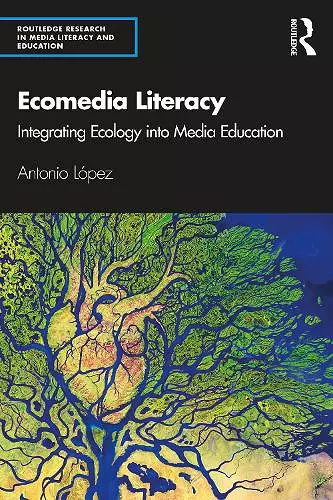Ecomedia Literacy
Integrating Ecology into Media Education
Format:Paperback
Publisher:Taylor & Francis Ltd
Published:30th Nov '20
Currently unavailable, and unfortunately no date known when it will be back
This paperback is available in another edition too:
- Hardback£145.00(9781138303386)

This book offers a focused and practical guide to integrating the relationship between media and the environment—ecomedia—into media education. It enables media teachers to "green" their pedagogy by providing essential tools and approaches that can be applied in the classroom.
Media are essential features of our planetary ecosystem emergency, contributing to both the problem of and solution to climate chaos, biodiversity loss, ocean acidification, deforestation, water contamination, and so on. Offering a clear theoretical framework and suggested curriculum guide, the book provides key resources that will enable media educators to apply ecomedia concepts to their curricula. By reconceptualizing media education, this book connects ecology, environmental communication, ecomedia studies, environmental humanities, and ecoliteracy to bridge media literacy and education for sustainability.
Ecomedia Literacy is an essential read for educators and scholars in the areas of media literacy, media and communication, media and cultural studies, environmental humanities, and environmental studies.
"Antonio Lopez's excellent book on ecomedia literacy makes major contributions to a growing literature on the topic that is important for making education relevant for key issues and problems of the day, and is important as well that citizens become aware of the growing ecological crises and challenges to a sustainable future."
Douglas Kellner, Distinguished Research Professor of Education, UCLA, USA
"Antonio Lopez is one of the remarkable media educators who has been working for years on developing a holistic and systemic framework for understanding media—a framework that incorporates a deep understanding not only of the politics and economics of media technologies, but of the ways they ethically implicate us as citizens active within expanding circles of social responsibility. Lopez’s ‘ecomediasphere’ model presents an admirable synthesis of insights from popular education, media and cultural studies, and the rapidly growing field of ecomedia theory and practice. This is cutting-edge work on a topic that couldn’t be more important."
Adrian J. Ivakhiv, Professor of Environmental Thought & Culture, University of Vermont, USA
"Antonio López's excellent book on ecomedia literacy makes major contributions to a growing literature on the topic that is important for making education relevant for key issues and problems of the day, and is important as well that citizens become aware of the growing ecological crises and challenges to a sustainable future."
Douglas Kellner, Distinguished Research Professor of Education, UCLA, USA
"Antonio López is one of the remarkable media educators who has been working for years on developing a holistic and systemic framework for understanding media—a framework that incorporates a deep understanding not only of the politics and economics of media technologies, but of the ways they ethically implicate us as citizens active within expanding circles of social responsibility. Lopez’s ‘ecomediasphere’ model presents an admirable synthesis of insights from popular education, media and cultural studies, and the rapidly growing field of ecomedia theory and practice. This is cutting-edge work on a topic that couldn’t be more important."
Adrian J. Ivakhiv, Professor of Environmental Thought & Culture, University of Vermont, USA
"Dr. Lopez’ work is possibly one of the most important works in this century, merging fields of study and enabling readers to see the tangible connections between ecology and media while inviting them to ditch old ways of thinking about media and media education."
Pamela Pereyra, Media Savvy Citizens, LLC, from Journal of Media Literacy Education Pre-Prints, #18.
ISBN: 9781138303393
Dimensions: unknown
Weight: 439g
288 pages